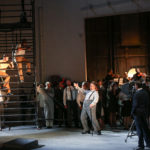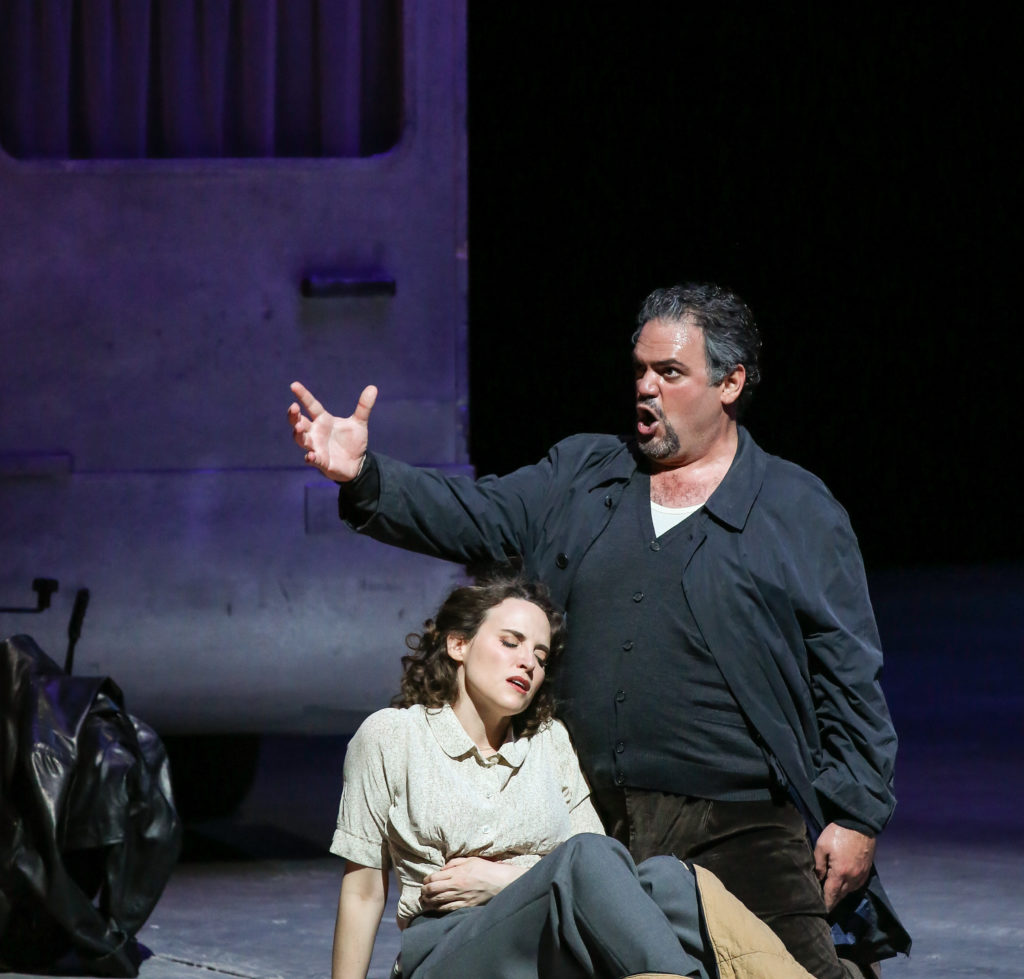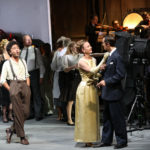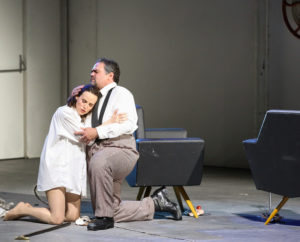No, it’s the scene from a B-picture they’re shooting. We’re on a film set, Cinecitta, Italy in the 1960s, for Volksoper’s modern, Stephen Langridge production of Verdi’s Rigoletto. And Richard Hudson (stage and costumes) uses film clips to comment on the opera. This is the ‘Court’ the Duke rules over, driven by the need to be famous, a hierarchy where you’re in or out.
But does this get us any closer to Verdi’s Rigoletto (1851), based on Victor Hugo’s Le Roi s’amuse– Verdi’s 19th Century contemporary. In dispute with the censors of an Italy, pre-Unification, of Dukedoms, small kingdoms, Verdi had to re-locate Rigoletto‘s background to Renaissance Italy.
But Verdi, an artist of his time, progressive, was dealing with human relationships, of psychological complexity beyond his time. Even engaging with sexism and misogyny. The Duke (of Mantua) is a lecher, sexual predator, who’s aided and abetted by Rigoletto, his dresser, the Court Jester. He’s crippled, the butt of the nobility’s (studio power brokers) contempt, which he fuels with his merciless wit. But, in a tragic twist, Rigoletto’s daughter Gilda, hidden from the Court, becomes a victim of its intrigues. In the opening scene, the Duke (Schirrmacher) boasts to his ‘courtiers’ of his conquests: so many beauties. (But not yet the wife of Count Ceprano.) He sings, Questa e quella, they’re all the same to him. Sexist, resonant of a contemporary Hollywood producer, who abused his power. There’s no love without freedom, sings Schirrmacher’s light tenor, mellifluous, but superficial. Schirrmacher, arty, with his long black hair, not a typical Hollywood producer, surely.
But his Rigoletto, Daniel de Vicente, is spot-on. Corpulent, squat- in houndstooth-check black and white trousers- hints of the clown, he makes fun of Ceprano (Marco di Sappio) who’s reneged on his promise, hasn’t delivered his woman.
In a scene of gross, abusive sexism, a bare-breasted blonde is horse-ridden and whipped. Everything is pleasure, Chorus sing: the decadence recalling Fellini’s La Dolce Vita, with its misogyny, and sexual machismo.
Ominously Monterone (Andreas Mitchke) introduces himself, Mitschke in a black suit out of a Cagney-era movie.  Rigoletto contemptuously accuses him of conspiracy. Monterone’s the father of a girl the Duke has seduced. Mitschke curses both master and servant, Duke and Rigoletto, Mitschke’s bass yet under-powered. But he’s an old man, we see manhandled, and later brutally beaten.
Rigoletto contemptuously accuses him of conspiracy. Monterone’s the father of a girl the Duke has seduced. Mitschke curses both master and servant, Duke and Rigoletto, Mitschke’s bass yet under-powered. But he’s an old man, we see manhandled, and later brutally beaten.
A Fiat 500 drives up to a compound. Rigoletto unlocks the wire fence. The old man cursed him! Vicente repeats like a mantra. The modern concrete building- industrial, 1950’s Italian neo-realist, an effective concept. Sparafucile (Yasushi Hirano),a contract killer, introduces himself. In his aria, Rigoletto sings we’re alike, he and Sparafucile, the assassin’s dagger, his murderous tongue. Highly dramatic, this Rigoletto- Vicente’s hunchback, played with such naturalism, the walking stick becomes part of him. And from him emanates the most lyrical baritone: how terrible to be a cripple, a clown without the right to weep. Vicente’s is a star performance.
‘These thoughts, they do torment him so’. But he’s transformed into another man as he enters his home, greeted by Gilda (Rebecca Nelsen.) Blonde, in white cardigan, check-shirt, Gilda’s the epitome of filial devotion, soothing her very troubled father. Nelsen sings exquisitely, she still doesn’t know the name of her mother. Her duet with Vicente is terrific, their relationship symbiotic. She touches the fence: hasn’t been out for three months! Gilda’s like a prisoner; ‘Only you are left to me’. He’s invested all his love in his daughter; elevated to an angel, but she’s only human.
She sings to Giovanna (Elvira Soukop) their servant, of seeing the man in church, a ‘poor student’, (the Duke disguised): but angel or devil, she’ll love him.
Schirrmacher emerges from the shadows. Their love duets are pleasant, but dull. ‘Divine love brings us closer than angels’; irresistible, lover’s rhetoric. Beautifully sung, apparently sincere, yet Schirrmacher,in black leather blouson, looks like a courier. ‘Gualdi Maldi’, the loved one’s name her heart beats to. Nelsen sings to Verdi’s syncopating orchestral accompaniment, hinting irony. Nelsen’s very good, her coloratura impressive; pointing up the adolescent lover’s flights of fancy.(She’s led a nun-like existence.) Nelsen is beguillng. But her innocence is in contrast to the gangsters outside, planning to kidnap her, this fragile songbird.
Male Chorus (Volksopera’s supplemented) sing behind Rigoletto, they’re celebrating a double triumph, to get even with him. They’re all wearing masks of disguise. (We the audience have to.) Verdi’s boisterous Chorus sing, they’ll capture his loved one, while he’s home. Not knowing it’s his daughter they’ve caught. Straight out of a B-Movie, The Curse!
At a private studio screening, Schirrmacher laments, ‘she was captured’. Schirrmcher’s rather good. Powerful, as he sings imagining the tears she would cry, and he couldn’t help her. The Duke is really desperate losing her. (Maybe she could have changed him?) But he reverts to type in the last Act.
Machismo Chorus boast, they saw a beauty, his beloved; jaunty, cheeky . But ‘Poor Rigoletto, deVicente, now very serious in a smartly tailored Italian-style beige suit, looking rather like a Berlusconi; but with a walking stick. (But that (politically astute) buffoon could never sing like this.) Vicente’s simply a great performance. He knows, his daughter’s here. Give her back: there’s nothing a man wouldn’t do for the honour of his daughter! He’s on his knees, he, a cripple. But, he pleads, costs them nothing, but she’s everything in the world for him. Have pity, gentlemen!
Gilda comes in, Nelsen wearing only a man’s white shirt. They’re alone, she and Rigoletto. Her admission, every Sunday, the secret assignation with the young man; her heavenly lover came last night to her. Then she was kidnapped.For Rigoletto, everything is lost, ‘the altar destroyed’. Cry my daughter, and let your tears flow. (Of course, he knows what his master is capable of.)
Yet threatens, a terrible revenge, like an act of God. She pleads for his forgiveness. Thrilling, affecting, Vicente and Nelsen, this symbiosis between father and daughter, the lynchpin of many Verdi operas.
A 1950s bar, traditional wood panels and fittings. Excellent staging: even a professional barman. He’s convinced her, Maddalena, he loves only her. Schirrmacher climbs behind the bar, sings his swan song: Il donna e mobile– woman is inconsistent, wavering. But observed by Rigoletto and Gilda (from Sparafucile’s caravan.) Schirrmacher’s splendid in this iconic, virtuoso aria, even hits those high Cs. (Meanwhile Sparafucile and Rigoletto do a deal: ‘our man is inside’.)
Sparafucile’s sister Maddalena (Alexandra Kloose), a lusty brunette, is ravished by the Duke, her legs splayed over the bar, oblivious. Maddalena’s tries to save ‘the stranger’, but Sparafucile’s mercenary. Gilda passes by, to sacrifice herself- Nelsen’s ‘young man’ in a coat, not very convincing, But they’ll kill anything. The stabbing is real enough.
Rigoletto sings jubilantly, his revenge over the Duke he’d waited years for. (Vicente’s so convincing, we’ve forgotten about his limp.) Oh joy…Then the refrain Il donna e mobile, mocking him through the upper window. The terrible realisation, as he looks in the body-bag. She revives only to sing, she’d lied. She loved him too much. (She’ll be with her mother in heaven.) Like in classical tragedy, Monterone’s curse has been fulfilled. Vicente’s harrowing, grief-stricken. Vicente and Nelsen’s are performances of rare power and conviction. And Volksoper’s orchestra, after months’ lock-down, played to the hilt under MD Lorenz C.Aichner. © PR.6.9.2021
Photos: Rebecca Nelsen, Daniel de Vicente ; Vincent Schirrmacher, ensemble; Daniel de Vicente ensemble; Rebecca Nelsen, Daniel de Vicente
All photos © Barbara Pálffy



